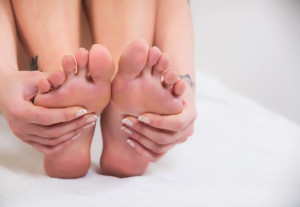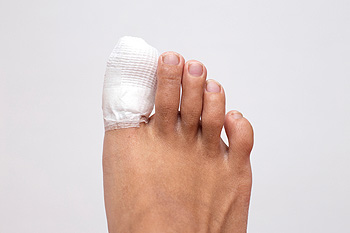
If you have diabetes, you may be aware of the effect that diabetes can have on your foot health. Diabetes, and the conditions that often accompany it, namely peripheral neuropathy and peripheral artery disease, can greatly increase one’s risk of developing foot problems. Roughly 25% of all people with diabetes develop foot complications at some point. Fortunately, these complications can be prevented or corrected if they are detected and treated early. Educating yourself about your condition, complying with your doctor’s recommendations, keeping your blood sugar under control, and inspecting the feet daily can all help prevent serious complications. A podiatrist can help you take care of your feet in many ways, such as by performing regular examinations and inspections of the feet, completing vascular assessments, and providing information on the best care practices for you. For more information on how to take care of your feet as a diabetic, consult with a podiatrist today.
Diabetic foot care is important in preventing foot ailments such as ulcers. If you are suffering from diabetes or have any other concerns about your feet, contact Dr. Edward D. Hutson from Easton, PA. . Our doctor can provide the care you need to keep you pain-free and on your feet.
Diabetic Foot Care
Diabetes affects millions of people every year. The condition can damage blood vessels in many parts of the body, especially the feet. Because of this, taking care of your feet is essential if you have diabetes, and having a podiatrist help monitor your foot health is highly recommended.
The Importance of Caring for Your Feet
Patients with diabetes should have their doctor monitor their blood levels, as blood sugar levels play such a huge role in diabetic care. Monitoring these levels on a regular basis is highly advised.
It is always best to inform your healthcare professional of any concerns you may have regarding your feet, especially for diabetic patients. Early treatment and routine foot examinations are keys to maintaining proper health, especially because severe complications can arise if proper treatment is not applied.
If you have any questions please feel free to contact our offices located in Easton, and Northampton, PA . We offer the newest diagnostic and treatment technologies for all your foot and ankle needs.
 When performing foot stretches, we often neglect stretching the toes. However, stretching the toes is very important, as bending the toes down from the knuckles stretches not only the toes but also the tighter muscles along the top of the foot, and the arch muscles along the sole of the foot. To perform this simple toe stretch, sit down and then place your fingers under the sole of the foot and place your thumbs on top of the toes. Pull back under the ball of the foot and stretch out the toes away from the foot while using your thumbs to bend the toes downwards at the knuckles of the foot. Hold this stretch for several seconds and repeat on the opposite foot. For more information about stretches that you can do to improve your foot health, please consult with a podiatrist.
When performing foot stretches, we often neglect stretching the toes. However, stretching the toes is very important, as bending the toes down from the knuckles stretches not only the toes but also the tighter muscles along the top of the foot, and the arch muscles along the sole of the foot. To perform this simple toe stretch, sit down and then place your fingers under the sole of the foot and place your thumbs on top of the toes. Pull back under the ball of the foot and stretch out the toes away from the foot while using your thumbs to bend the toes downwards at the knuckles of the foot. Hold this stretch for several seconds and repeat on the opposite foot. For more information about stretches that you can do to improve your foot health, please consult with a podiatrist.
Stretching the feet is a great way to prevent injuries. If you have any concerns with your feet consult with Dr. Edward D. Hutson from Easton, PA. . Our doctor will assess your condition and provide you with quality foot and ankle treatment.
Stretching the Feet
Being the backbone of the body, the feet carry your entire weight and can easily become overexerted, causing cramps and pain. As with any body part, stretching your feet can serve many benefits. From increasing flexibility to even providing some pain relief, be sure to give your feet a stretch from time to time. This is especially important for athletes or anyone performing aerobic exercises, but anyone experiencing foot pain or is on their feet constantly should also engage in this practice.
Great ways to stretch your feet:
Individuals who tend to their feet by regular stretching every day should be able to minimize foot pain and prevent new problems from arising.
If you have any questions, please feel free to contact our offices located in Easton, and Northampton, PA . We offer the newest diagnostic and treatment technologies for all your foot care needs.
 A broken toe is generally the result of direct trauma, which can be caused by stubbing your toe against a piece of furniture. Additionally, a break can happen from a heavy object being dropped on the toe, and immediate pain and discomfort often accompanies this type of injury. In severe fractures, the bone may be displaced and can protrude from the skin. If the break is mild, a method that is known as buddy taping may be effective in accelerating the healing process. This is accomplished by taping the affected toe to the toe next to it, which can provide the stability that is necessary for proper healing. If you have broken your toe, it is suggested that you consult with a podiatrist who can perform an X-ray and offer you the correct treatment options.
A broken toe is generally the result of direct trauma, which can be caused by stubbing your toe against a piece of furniture. Additionally, a break can happen from a heavy object being dropped on the toe, and immediate pain and discomfort often accompanies this type of injury. In severe fractures, the bone may be displaced and can protrude from the skin. If the break is mild, a method that is known as buddy taping may be effective in accelerating the healing process. This is accomplished by taping the affected toe to the toe next to it, which can provide the stability that is necessary for proper healing. If you have broken your toe, it is suggested that you consult with a podiatrist who can perform an X-ray and offer you the correct treatment options.
A broken toe can be very painful and lead to complications if not properly fixed. If you have any concerns about your feet, contact Dr. Edward D. Hutson from Easton, PA. . Our doctor will treat your foot and ankle needs.
What to Know About a Broken Toe
Although most people try to avoid foot trauma such as banging, stubbing, or dropping heavy objects on their feet, the unfortunate fact is that it is a common occurrence. Given the fact that toes are positioned in front of the feet, they typically sustain the brunt of such trauma. When trauma occurs to a toe, the result can be a painful break (fracture).
Symptoms of a Broken Toe
Generally, it is best to stay off of the injured toe with the affected foot elevated.
Severe toe fractures may be treated with a splint, cast, and in some cases, minor surgery. Due to its position and the pressure it endures with daily activity, future complications can occur if the big toe is not properly treated.
If you have any questions please feel free to contact our offices located in Easton, and Northampton, PA . We offer the newest diagnostic and treatment technologies for all your foot and ankle needs.
Read more about What to Know About a Broken Toe The medical condition that is referred to as gout is considered to be a form of arthritis. Common symptoms of this ailment often consist of severe pain and discomfort in the joints of the big toe. The pain can be debilitating, and it may be difficult to complete daily activities. Gout can develop as a result of having elevated uric acid levels in the blood, which generally happens due to high purine levels. This can happen as a result of genetic factors, from eating foods such as shellfish and red meat, and from drinking excessive alcohol. Additionally, it may occur in patients who are obese, or who have chronic kidney disease. Research has indicated that it may be beneficial to implement healthy eating habits into your daily routine, as this may limit the amount of gout attacks. If you have frequent bouts of gout, it is suggested that you consult with a podiatrist who can offer you prevention and treatment options.
The medical condition that is referred to as gout is considered to be a form of arthritis. Common symptoms of this ailment often consist of severe pain and discomfort in the joints of the big toe. The pain can be debilitating, and it may be difficult to complete daily activities. Gout can develop as a result of having elevated uric acid levels in the blood, which generally happens due to high purine levels. This can happen as a result of genetic factors, from eating foods such as shellfish and red meat, and from drinking excessive alcohol. Additionally, it may occur in patients who are obese, or who have chronic kidney disease. Research has indicated that it may be beneficial to implement healthy eating habits into your daily routine, as this may limit the amount of gout attacks. If you have frequent bouts of gout, it is suggested that you consult with a podiatrist who can offer you prevention and treatment options.
Gout is a painful condition that can be treated. If you are seeking treatment, contact Dr. Edward D. Hutson from Easton, PA. . Our doctor will treat your foot and ankle needs.
What Is Gout?
Gout is a form of arthritis that is characterized by sudden, severe attacks of pain, redness, and tenderness in the joints. The condition usually affects the joint at the base of the big toe. A gout attack can occur at any random time, such as the middle of the night while you are asleep.
Symptoms
Risk Factors
Prior to visiting your podiatrist to receive treatment for gout, there are a few things you should do beforehand. If you have gout you should write down your symptoms--including when they started and how often you experience them, important medical information you may have, and any questions you may have. Writing down these three things will help your podiatrist in assessing your specific situation so that he or she may provide the best route of treatment for you.
If you have any questions, please feel free to contact our offices located in Easton, and Northampton, PA . We offer the newest diagnostic and treatment technologies for all your foot care needs.